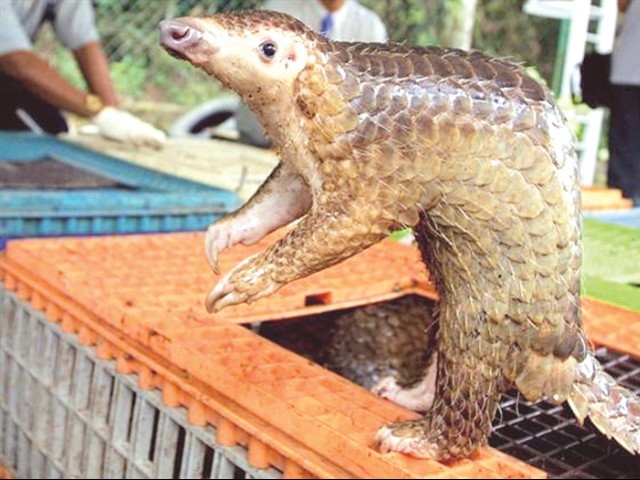
The Indian pangolin is one of Pakistan's most endangered species. Also called thick-tailed pangolin and scaly anteater, this mammal's population has been dwindling fast due to several factors, including poaching, illegal trade, habitat destruction, and the effects of climate change. The third Saturday of February is annually marked as World Pangolin Day to raise awareness about this beautiful but the most trafficked creature.
Classified as Endangered on the International Union for Conservation of Nature's (IUCN) Red List, the Indian pangolin's population continues dropping. Particularly in the Pothohar region, the pangolin has vanished from over 80% of its historic range. Although exact population figures are not available, studies suggest that the global population of this mammal could drop by 50% over the next 20 years or so.
According to WWF-Pakistan, the Indian pangolin is protected by both federal and Sindh wildlife laws. Since 2016, it has also been listed in Appendix I of the Convention on International Trade in Endangered Species (CITES), which prohibits international trade in pangolins and their products, including scales. However, these laws have done little to mitigate the threats the species faces.
The main threat is poaching. The pangolin's scales are highly sought after in traditional medicine and illegal markets, especially in Southeast Asia and China. Habitat destruction due to urbanisation, agricultural expansion, and deforestation continues to exacerbate the species' plight. Pakistan has also become a transit route for the illegal trafficking of pangolin scales.
WWF-Pakistan has urged provincial wildlife departments and law enforcement agencies to take immediate action to curb illegal pangolin trade. "Poaching, habitat loss, and illegal trafficking are pushing pangolins toward extinction. We must protect these unique creatures by tackling the illegal wildlife trade and safeguarding their habitats," Muhammad Jamshed Iqbal Chaudhry, Senior Manager for Research and Conservation at WWF-Pakistan, told The Express Tribune.
According to him, WWF-Pakistan has proposed several measures to conserve the Indian pangolin, including the establishment of community-based pangolin protection zones (PPZs) in main habitats such as the Pothohar Plateau, Margalla Hills, and Azad Jammu and Kashmir.
























COMMENTS
Comments are moderated and generally will be posted if they are on-topic and not abusive.
For more information, please see our Comments FAQ